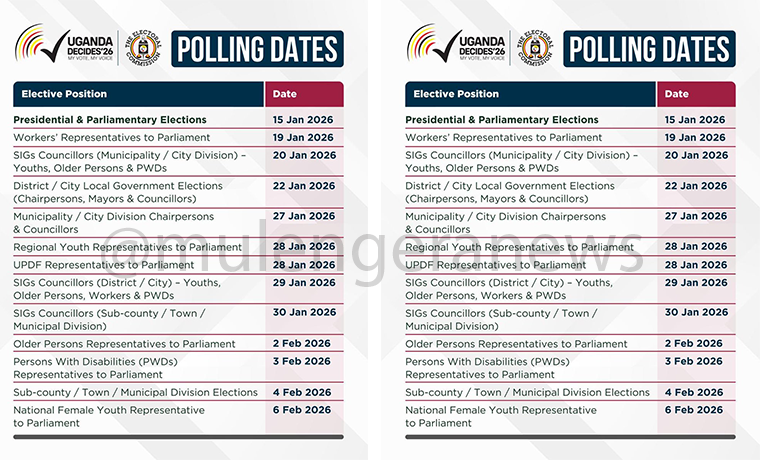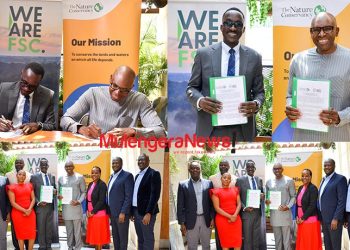By Mulengera Reporters
On Thursday morning, stakeholders in the finance sector converged at Golf Course Hotel to witness the launching of the GoU report on “Fostering a Sustainable Agro-Industrialization Agenda in Uganda.”
The report was prepared by Dr. Sarah Sewanyana-led Economic Policy Research Center (EPRC) based at Makerere University. The researchers who inputed into the report included Prof Julius Kiiza, Guloba Madina, Isaac Shinyekwa, Munyambonera Ezra, Job Lakal, Paul Corti Lakuma, Florence Nakazi, Martin Luther Munu, Mwesigye Francis, Mildred Barungi, Mbowa Swaibu, Tonny Odokonyero, Anita Ntale, Rudaherwana Nicodemus and others. PSFU’s Gideon Bagadawa Prof Ogenga Latigo’s role is also acknowledged by EPRC management. Overall supervision was done by a Finance Ministry team headed by Deputy PSST Patrick Ochailap.
The report makes a strong case on why the agriculture-based approach must be a major ingredient in Uganda’s industrialization strategy. It ought to be stressed that industrialization is the ultimate objective in the Museveni government’s Vision 2040 that is meant to be accomplished through 6 National Development Plans (NDPs) each of 5 years. The report argues that industrializing agriculture is the only way Uganda can achieve inclusive industrialization because of the immense opportunities agriculture offers being the major employer of more than 70% of the population.
Reflecting on experiences of other late-industrializing economies (like USA, Germany, Japan and the Asian Tigers), the report also reflects on Uganda’s failed historical struggles to industrialize and recommend nine (9) agricultural commodities that must be prioritized based on their marketability and potential to economically emancipate many people.
These are coffee, tea, maize, cassava, cotton, oil palm, fish, beef and dairy. The researchers say that these 9 are inevitable because they can give “optimal impact and returns.” That generic listing of priorities has in the past not led Uganda anywhere and now is time to concentrate on a few priority commodities to avoid stretching the very limited resources. The 9 commodities are characterized to represent “strategic, specific and fundable priorities” regarding Uganda’s “Agro-Industrialization Agenda.”
The background to the report is that in January 2017, government nervously realized the economy was declining and the Finance Ministry desired to design evidence-based interventions and that is how EPRC (renowned for being an independent think tank on economic policy matters) was contracted to undertake the research and came up with a report advising on the best way forward. To ensure the report findings (which we shall detail later) is 100% implemented, a high level steering and coordination committee has been put in place. And its coordination, according to EPRC boss Dr. Sarah Sewanyana, had to be the Finance Ministry because it has clout to whip everybody in line. It comprises of representation from EPRC, private sector and line government MDAs.


SERIOUS BUSINESS
The seriousness with which the Finance Ministry is taking this EPRC-led process manifested in the high level representation at the report launch. Present was Matia Kasaija and PSST Keith Muhakanizi who sent a representative with a prepared message.
The morning launching ceremony was characterized by many interesting (behind the scenes) happenings that we are compelled to share in this article. And in Patrick Kamara, the organizers couldn’t have found a better moderator for the session. As ever, the scribe from Toro cracked many jokes livening up what would otherwise have been a stressful discussion.
Plenary speakers included Dr. Kisamba Mugerwa who expressed pessimism Dr. Sewanyana’s great report would be implemented leading to desired objectives. Responding later, Dr. Sewanyana urged Kisamba to be hopeful for once. In what some perceived as hitting below the belt, the EPRC boss urged Kisamba to realize time for lamenting was now behind us. We must all have the mindset of making possible the impossible, she said. Sewanyana also defended their report saying EPRC findings hadn’t been influenced by anyone. She jokingly urged Kisamba to be like her and have faith in God.

BANYENZAKI ROARS
Speaking during plenary, ex-Minister Henry Banyenzaki criticized Kasaijja for inadequately funding Uganda Development Corporation (UDC) and also questioned why the Trade Ministry was being sidelined. His view was the “Agro-Industrialization Agenda” must be coordinated by Amelia Kyambadde’s trade ministry and not Finance. Ironically Banyenzaki worked at Finance before as State Minister.
Banyenzaki also doubted if recapitalizing UDB as a strategy to force down interest rates and avail agricultural investors with cheap credit will adequately help agro-industrialization. He said UDB’s effectiveness was being hampered by its being a Kampala-based bank without branches upcountry. “UDB should be regionalized with branches to serve farmers upcountry,” Banyenzaki said commending moves to transfer the ACF billions from BoU to UDB. He also demanded GoU-spearheaded industries to be everywhere and not just Namanve.
As Kasaija uneasily turned in his seat, Banyenzaki also wondered why no steps where being taken to enforce local content rules to ensure foreigners like the Chinese and Indians don’t “fluke” things to total exclusion of Ugandan farmers who should be the primary beneficiaries of the agro-industrialization strategy. Banyenzaki was so critical, Kamara had to jokingly remind the audience “by the way the man who has just spoken was until recently a minister in this same government.”
Representing Stanbic Bank, Richard Wangwe said industrializing Uganda won’t be easy “because even the Soroti fruit factory isn’t going to work because we don’t have the right fruits.” He challenged government to show real seriousness by increasing funding to both UDC and UDB because their current combined capital can’t adequately support even two serious industrial projects capable of yielding the results government is desiring.
Another private sector person, operating a $5m coffee processing/exporting business and supporting 1.5m farmers under 200 farmer organizations, told Kasaijja that industrialization won’t be achieved until private sector actors like himself are enabled to have access to cheap financing. “Hon Minister it’s good I have met you today. I’m a local investor and I don’t want free money from your government. Just enable me access cheap credit and the rest I will handle,” the coffee investor said attracting laughter. He wondered why planners at Finance don’t seem to appreciate there is a difference between trade and development finance.
At some point, Kamara called for representatives from UDC, MAAIF or even Trade Ministry to step forward and respond to criticisms that had been made of them during plenary and ironically there wasn’t a single representative. This irked Kasaija who later wondered why all this defiance by government ministries yet he had written inviting them to the report launching ceremony.

KASAIJA’S TURN
The Finance Minister used the event to share his frustrations as a commercial farmer. He said when still Uganda’s Ambassador to Saudi Arabia, Prof Badru Kateregga boosted his goat farming business by getting him Arabs who demanded 4,000 goats per month.
Kasaijja said “I considered myself a very rich successful goat farmer but the first order came when I had only 1,500 goats. I hired trucks to go to Lango and I only collected 50 goats from all those villages.” He said it was total embarrassment and it showed Uganda’s unreadiness. Kasaija said his experience proved to him market has never been a problem for Uganda agri-products. “Capt Roy was ready to fly the goats directly to Saudi Arabia and mobilizing 4000 goats took us months and by the time we reached there, the goats were rejected for bad quality,” said Kasaijja who repeatedly bragged “I’m a very rich man nevertheless.”
He also referred to the NRA bush war experience where Museveni always told them not to insist on many things but a few which are core. “We onetime became very frustrated and I remember in the meeting we asked him Chairman what do we exactly need to execute this war [against Obote]? He told us all I need are guns and once I have them I will get the uniforms and money as well. Indeed we used those guns to get money as you know. In the same way we need to prioritize a few crops and the rest will fall into place,” Kasaija said. He recalled some offered radio equipment to boost NRA propaganda but Museveni declined saying it wasn’t a priority. His priority was guns which Kasaija said in the end led him [M7] to have everything else he desired.
Kasaijja, who was a top manager in Shell Uganda, recalled: “I had two guns and about 20 bullets which had been assigned to guard me as a top executive. I got them from my bodyguard and I surrendered them to our Chairman and he kept his word because using those guns he grew the resistance movement until we captured power.”
Kasaija also showed frustrations with people in government and the too much bureaucracy thereof. “That’s the problem with you guys. Your government things aren’t easy. I’m a private sector person,” he said before reflecting on 2021 elections. “We have areas which are challenging but I’m sure we are going to win that election like we have always done. The only problem is that NRM leaders aren’t keen to blow their trumpet for the things that have been done and that’s their problem,” he said.
He claimed he is confident Ugandans still love NRM because its track record speaks for itself. Responding to Dr. Kisamba Mugerwa, whose skepticism EPRC boss Sarah Sewanyana had complained about, Kasaija said: “Hon Kisamba how is it in your Bamunanika? Isn’t it evident that people’s lives have greatly changed? Munange in the case of Kibale things have changed a great deal. And in Buyanja where I come from you can’t find a grass-thatched house. The only challenge now is electricity. They say Hon Minister you told us to roof our houses. We did it and where is electricity? It’s my biggest problem now and if I don’t deliver electricity those young people might even vote me out.”
Kasaijja also cynically responded to OWC Deputy Coordinator Gen Charles Angina who, like Banyenzaki, criticized government for underfunding agriculture. Kasaija enumerated areas like water, rural electrification, ACF, UDB, feeder roads, NAADS and UDC which have been heavily funded in the FY2019/20 budget with a view to indirectly impact on agriculture. “Gen Angina let’s look at the government as the different parts of the body each re-enforcing the other. Let’s not look at agriculture just in terms of what has directly been allocated. There are many other areas that compliment agricultural development,” Kasaija said. (For comments, call, text or whatsapp us on 0703164755 or email us at mulengera2040@gmail.com).






























